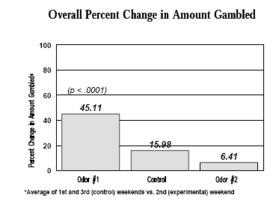The WAGER, Vol. 3(26) – Olfactory stimuli and gaming behavior
The marked effect that flavor and frangrance have on consumer culture has long been recognized by psychologists and marketing pundits alike. In 1997 alone, a New York Stock Exchange company grossed over 1.4 billion dollars providing odors and tastes for products we use daily [1]. Alan R. Hirsch of the Smell & Taste Research Foundation, Ltd., designed and implemented a study to determine the effect(s) of odor on the spending habits of Las Vegas gamblers [2]. Hirsch selected two distinct odors that previously had been determined by research to be pleasant. Each odor was then introduced into one of two gambling areas containing slot machines. Over the course of a weekend, the amount spent by gamblers was recorded, with a similar procedure occurring in a third, odorless control area. These figures were then compared with several sets of baseline data, gleaned from previous and following weekends at the same locales. Hirsch found that gross revenues obtained in the area introduced with odor 1 had increased 45.11% over a baseline average. The area in which odor 2 was introduced registered a 6.41% increase, dwarfed by the 15.98% gain in the control area. Similarly, it was found that revenue intake was positively correlated with the relative level of odor 1 present in the environment.
Hirsch provides two tentative explanations for his data. He cites the olfactory-evoked recall model, in which particular odors trigger particular affective states that can induce a particular action. A second possibility involves the synergy of context and odor that might reinforce certain tendencies and motivations. In the end, Hirsch admits, it is unlikely that the presence of odor 1 alone magically caused non-gamblers to empty their pockets at the slots. It is even more unlikely that there existed a direct causal relationship between odor and gambling. Rather, the most salient result of this study is to provide a launching point for further research on the nexus of affect, associations, and external stimuli in the personality of the gambler. Further studies could examine the effects of established mood-altering odors on gaming behavior. The work of market researchers and aromatherapists could be utilized for this purpose. Furthermore, imaging technology could be employed to determine the effects of external stimuli on the neurochemistry of the gambler.
Sources:
- 1997 revenue data as reported on-line by Morningstar. (www.morningstar.net)
- 2Hirsch, A. R. (1995). Effects of ambient odors on slot-machine usage in a Las Vegas casino. Psychology and Marketing, 12(7), 585-594.
This public education project is funded, in part, by The Andrews Foundation and the National Center for Responsible Gaming.
This fax may be copied without permission. Please cite The WAGER as the source.
For more information contact the Massachusetts Council on Compulsive Gambling, 190 High Street, Suite 6, Boston, MA 02110, U.S.
